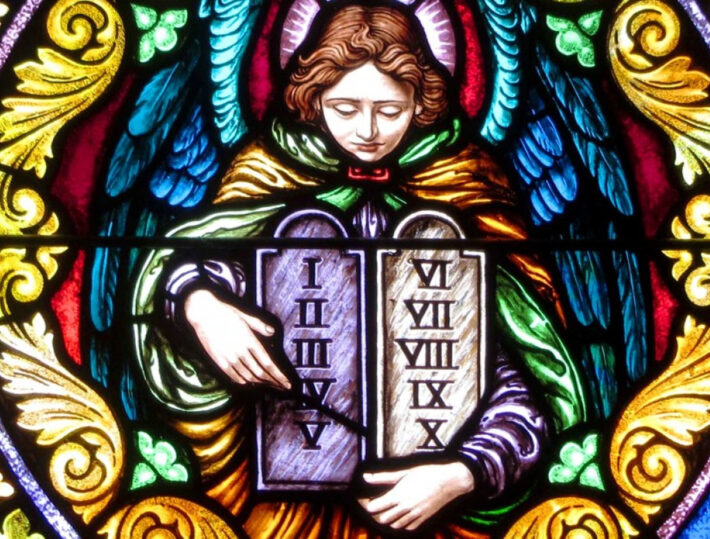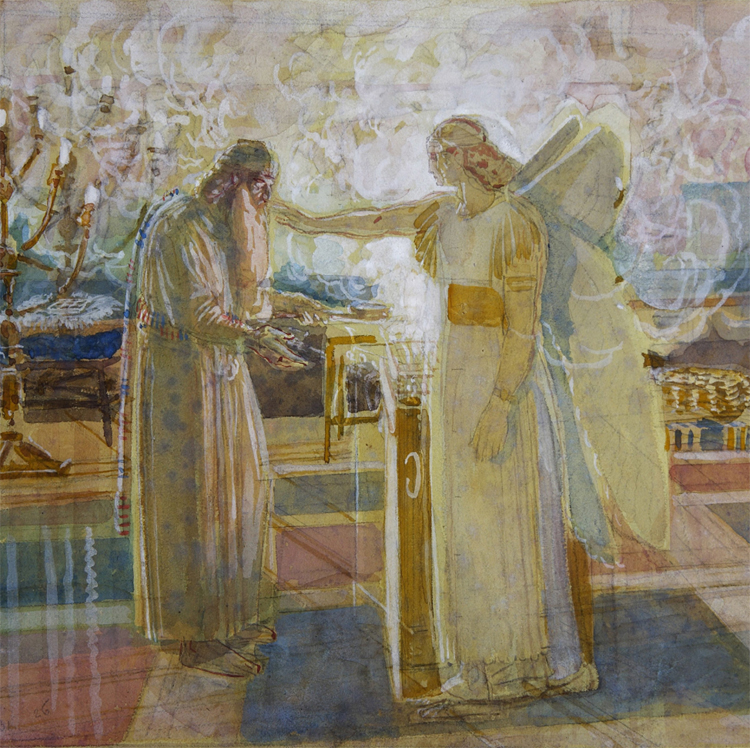Christian Art | Jesus And The Commandments
Mark 7: 1-13 – Week 5 Ordinary Time, Tuesday (Audio Bible KJV, Spoken Word)
1 THEN came together unto him the Pharisees, and certain of the scribes, which came from Jerusalem.
2 And when they saw some of his disciples eat bread with defiled, that is to say, with unwashen, hands, they found fault.
3 For the Pharisees, and all the Jews, except they wash their hands oft, eat not, holding the tradition of the elders.
4 And when they come from the market, except they wash, they eat not. And many other things there be, which they have received to hold, as the washing of cups, and pots, brasen vessels, and of tables.
5 Then the Pharisees and scribes asked him, Why walk not thy disciples according to the tradition of the elders, but eat bread with unwashen hands?
6 He answered and said unto them, Well hath Esaias prophesied of you hypocrites, as it is written, This people honoureth me with their lips, but their heart is far from me.
7 Howbeit in vain do they worship me, teaching for doctrines the commandments of men.
8 For laying aside the commandment of God, ye hold the tradition of men, as the washing of pots and cups: and many other such like things ye do.
9 And he said unto them, Full well ye reject the commandment of God, that ye may keep your own tradition.
10 For Moses said, Honour thy father and thy mother; and, Whoso curseth father or mother, let him die the death:
11 But ye say, If a man shall say to his father or mother, It is Corban, that is to say, a gift, by whatsoever thou mightest be profited by me; he shall be free.
12 And ye suffer him no more to do ought for his father or his mother;
13 Making the word of God of none effect through your tradition, which ye have delivered: and many such like things do ye.
In today’s Bible reading, we see clearly that many of those to whom Mark addresses his Gospel would not be familiar with Jewish customs. Mark, therefore, explains that the Jews wash as a ritual of purification prior to eating. This was initially a prescription for how priests should wash before offering sacrifice – see Exodus 30: 17ff – and was extended by tradition to all Jews before every meal. It may be helpful for us to remember that this was not a matter of hygiene; rather ritual purification was a symbol of the moral purity a person should have when approaching God. We may also consider our own practice of washing our hands and saying grace before meals, such that our participating in a meal becomes an act of thanksgiving to God, the meal a sacred space.
The Pharisees notice that some of Jesus’ disciples have not washed their hands before eating. They object to this, and Jesus retorts that their objection does not arise from sincere love of God. Rather, Jesus says, they are hypocrites; they pay lip service to God, but their hearts are far from God.
Jesus speaks specifically of the way in which the fourth commandment, to honour father and mother, has been corrupted from its true meaning by the Pharisees and the Temple authorities. In Jesus’ time, they were saying that people who gave to the Temple were absolved from supporting their parents; what people would have given to their parents, they may now say is Corban, meaning an offering for the altar, and may feel this is actually a better way of disposing of wealth. The religious leaders praised this behaviour as pious, while what was actually happening was abhorrent, elderly parents being left to fend for themselves – appalling neglect under a cloak of piety. Jesus speaks out against such hypocrisy. It is clear that the love of God is missing from such so-called pious practices. The true heart of the commandments has been lost, and is recovered by Jesus.
‘Abraham took the wood for the burnt offering, loaded it on Isaac, and carried in his own hands the fire and the knife. Then the two of them set out together. Isaac himself carries the wood for his own holocaust: this is a figure of Christ. For Christ carried the burden of the cross himself, and yet to carry the wood for the holocaust is really the duty of the priest. So Christ is then both victim and priest. This is the meaning of the expression: they set out together. For when Abraham, who was to perform the sacrifice, carried the fire and the knife, Isaac did not walk behind him, but with him. In this way he showed that he exercised the priesthood equally with Abraham.
‘What happened next? Isaac spoke to his father Abraham, “Father” he said. This plea from the son was at that instant the voice of temptation. For do you not think the voice of the son who was about to be sacrificed struck a responsive chord in the heart of the father? Although Abraham did not waver because of his faith, he responded with a voice full of affection: “Yes, my son” he replied. “Look,” said Isaac, “here are the fire and the wood, but where is the lamb for the burnt offering?” Abraham answered, “My son, God himself will provide the lamb for the burnt offering”.
‘The careful yet loving response of Abraham moves me greatly. I do not know what he saw in spirit, because he did not speak of the present but of the future: God himself will provide the lamb. His son asks what is to happen now, but Abraham”s reply concerns the future. Indeed the Lord himself provided a lamb, in Christ.
‘Abraham stretched out his hand and seized the knife to kill his son. But the angel of the Lord called to him from heaven. “Abraham, Abraham” he said. “I am here” Abraham replied. “Do not raise your hand against the boy” the angel said. “Do not harm him, for now I know you fear God”. Compare this to what St Paul says when he speaks of God: He did not spare his own Son but gave him up for us all. God emulates man with magnificent generosity. Abraham offered to God his mortal son who did not die; God gave up his immortal Son who died for all of us.
‘Then looking up, Abraham saw a ram caught by its horns in a bush. We said before that Isaac is a type of Christ. Yet this also seems true of the ram. It is worth understanding how both are figures of Christ – Isaac who was not killed and the ram which was. Christ is the Word of God, but the Word became flesh.
‘Christ therefore suffered, but in the flesh. Christ, the bodily Christ, endured death; and the ram signifies that body and that death. As John said: Behold the lamb of God, behold him who takes away the sins of the world. The Word, on the other hand, remained incorruptible. This is Christ according to the spirit, and Isaac signifies that spirit. Therefore, Christ himself is both victim and priest according to the spirit. For he offers the victim to the Father according to the flesh, and he is himself offered on the altar of the cross.’ (Origen’s homilies on Genesis.)
Concluding Prayer
True light of the world, Lord Jesus Christ,
as you enlighten all men for their salvation,
give us grace, we pray,
to herald your coming
by preparing the ways of justice and peace,
Who live and reign with the Father and the Holy Spirit,
God, for ever and ever.








